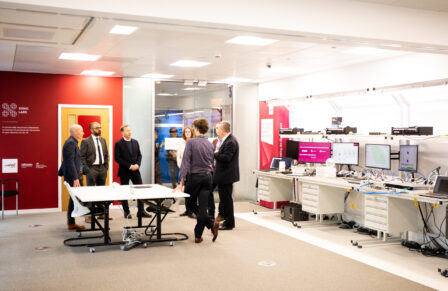UK remains the epicentre of deeptech innovation in the eyes of European investors
Posted 28 Nov 2023
UK remains the epicentre of deeptech innovation in the eyes of European investors
- Pan-European research from Digital Catapult of more than 1,250 early-stage investors closely examines attitudes towards most notable investment risks and opportunities, the current |deeptech landscape, inclusive investment initiatives, and the state of green tech investment
- The data reveals that 25% of investors view the UK as the deeptech epicentre of Europe, though Germany is hot on its heels (24%)
- Generative AI and Responsible AI lead the field as the two technological areas that European investors believe have the greatest potential for growth in the next 12 months
- 69% of European investors have changed their risk appetite in response to challenging economic circumstances across the continent. This shift is even more pronounced in the UK, where 75% have reviewed their risk strategy
- A lack of investor understanding/knowledge (31%) and limited access to talent/skills (33%) are cited as the biggest risk for deeptech investing and the biggest challenge for tech start-up investment respectively
- Though 99% of investors acknowledge that there is some form of bias in the investment process, to some extent, investors blame founders for reduced opportunities, with 41% citing a lack of investment knowledge as the principal culprit for start-ups struggling to secure funding
Digital Catapult, the UK authority on advanced digital technology, has released its European Investor Attitude Tracker, which represents a comprehensive pulse check on the early-stage investor ecosystem across Europe.
The pan-European research comprises data compiled from more than 1,250 early-stage investors from across the UK, France, Germany, Netherlands and Spain. Investors surveyed have invested in 97 start-ups on average, with an average investment of £821,460, and an average success rate of 26%.
With the UK government having stated its aim to make the nation an “international technology superpower” by 2030, European investors believe the UK is well on its way to achieving this ambition with 25% of respondents touting it as the epicentre of Europe’s deeptech development and investment. Germany, however, is only marginally behind, with 24% of investors holding this view about the continent’s largest economy by GDP.
Dr Jeremy Silver, CEO of Digital Catapult, said:
“The UK has a history of incubating some of the most investable deep tech businesses in Europe and, as this new data reveals, despite ongoing economic headwinds and geo-political crises, investment appetite for sustainable, advanced technology-based solutions remains strongly focused on the UK.
Investors cited lack of industry connections and the challenge of navigating the startup landscape as one of the biggest barriers to investing in deep tech startups. That’s a challenge which Digital Catapult is here to help address. Our role remains to help increase private and corporate investor confidence through a dynamic range of acceleration and innovation programmes. ”
Against the backdrop of a year of ground-breaking developments and significant technological advances in the field of Artificial Intelligence, Generative AI (18%) and Responsible AI (14%) are touted as the two areas with the biggest potential for growth. These were followed by Spatial Computing (13%), the Metaverse (13%), Quantum Computing (11%), Web3 (11%), Digital Twins (11%), and 6G (9%).
Driven by the war in Ukraine, soaring price rises due to ongoing inflationary pressures, and a cost-of-living crisis across Europe, early-stage investors have seemingly adapted their appetite for risk accordingly. More than two-thirds (69%) have reviewed their risk strategy, with this being most pronounced in the UK, where 75% have taken this action.
However, 35% of investors buck this trend and say that their risk appetite is higher despite economic challenges. Those investors with larger start-up portfolios (250+ investments) are even more bullish, with 44% saying their risk appetite has increased.
The three biggest challenges investors cite when funding deeptech businesses are their lack of understanding/knowledge about deep tech startups (31%), lack of industry connections (30%), and a high chance of failure (30%). And beyond a specific deeptech focus, investors view limited access to talent/skills (33%), regulatory/legal obstacles (33%), and competition from large incumbents (31%) as the most limiting factors when backing technology start-ups.
Turning to inclusivity around the investment process, a staggering 99% of respondents believe some form of bias is present in the investment process. This is most detectable in scouting (43%) and deal flow (43%). This is closely followed by investment committees (42%). German investors are most positive about their market’s potential to offer equal access to capital to founders (78%), compared to just 53% in France.
Founders who struggle the most to access capital are, according to respondents, likely to come from less wealthy backgrounds (37%); have a disability (33%); or belong to an ethnic minority (32%). However, to some extent, investors do in fact blame founders for reduced opportunities, with 41% of respondents citing a lack of investment knowledge as the principal culprit for start-ups struggling to secure investment.
For more information, you can download the European Investor Attitude Tracker here.






